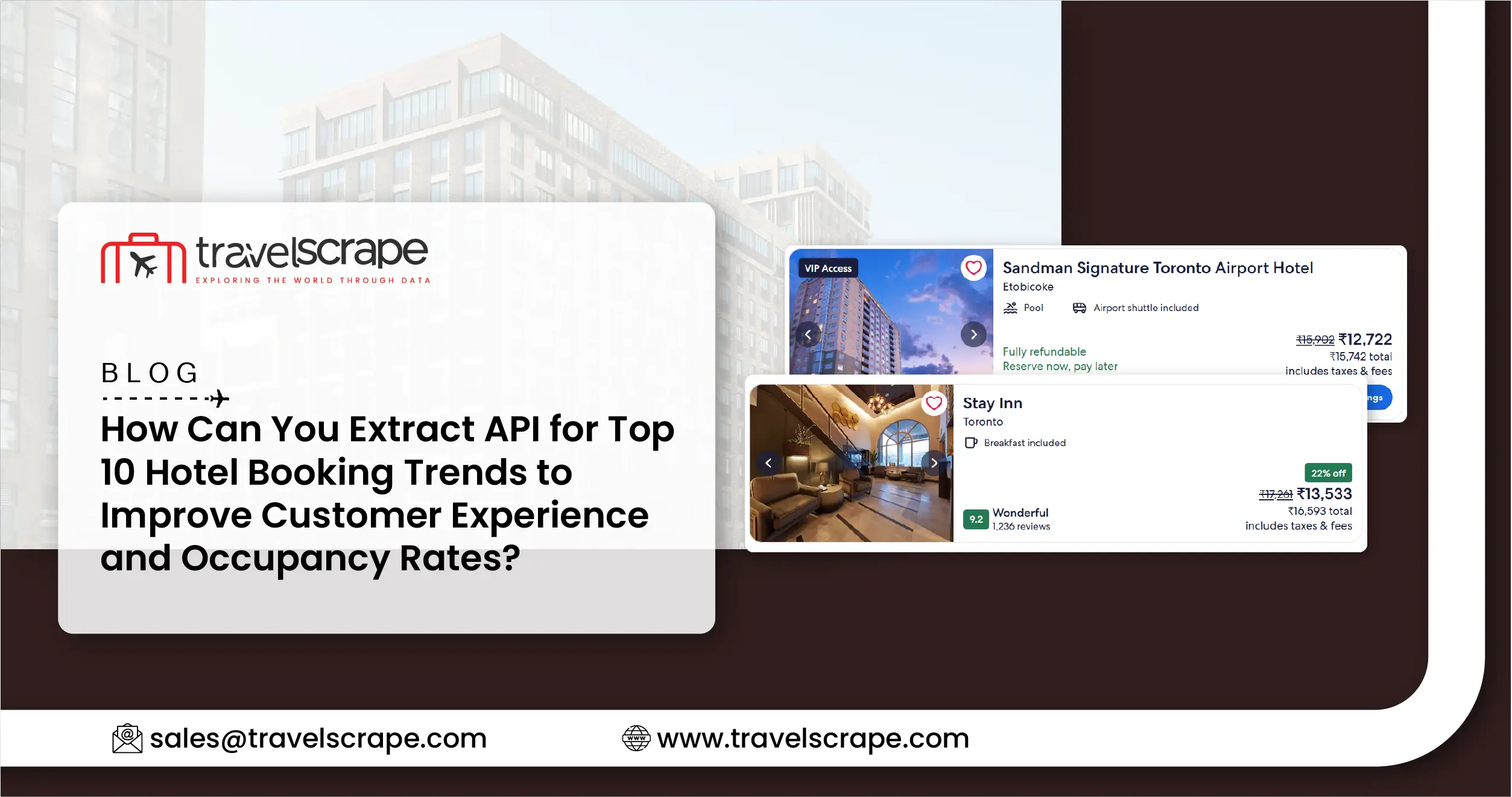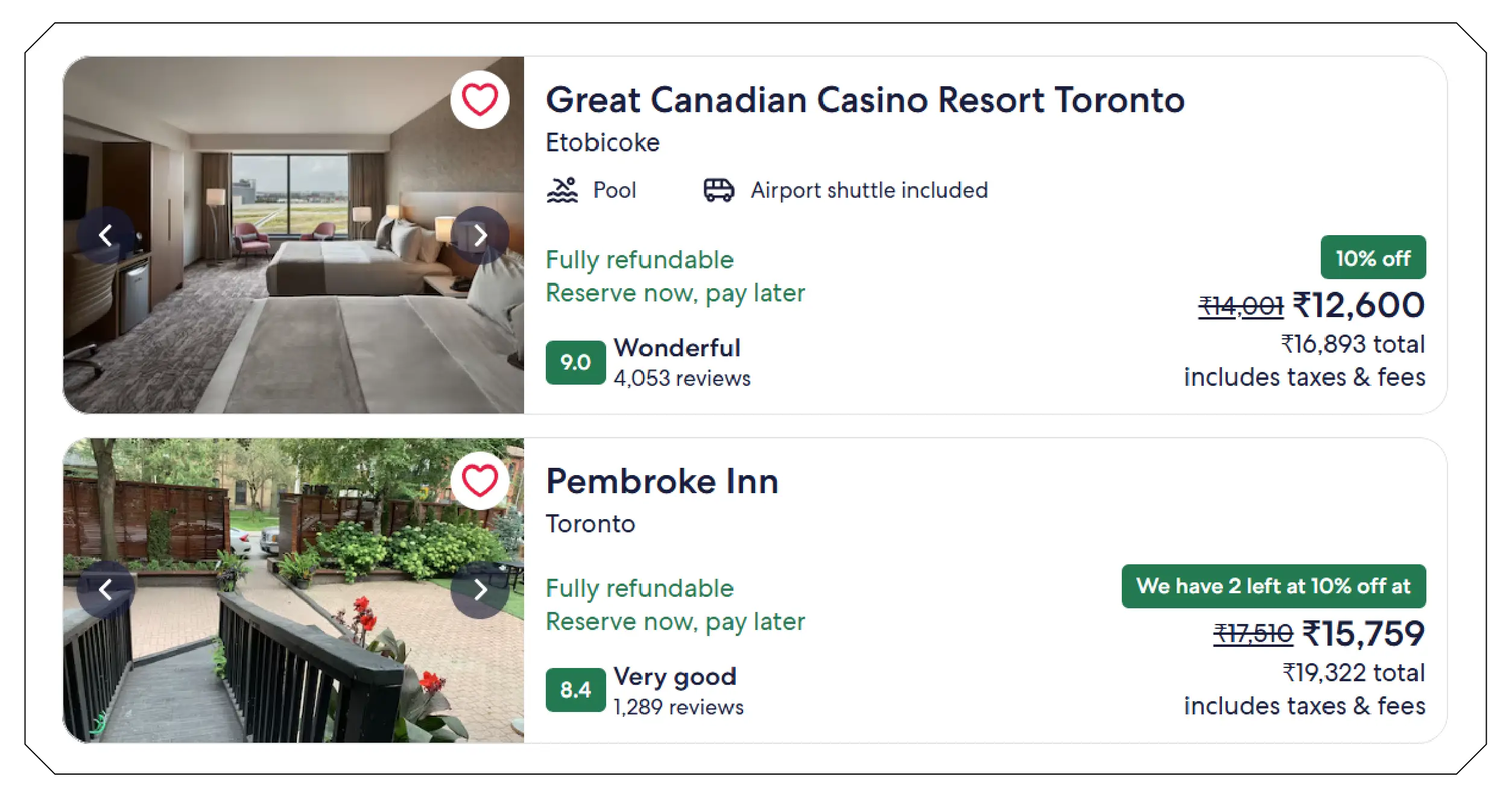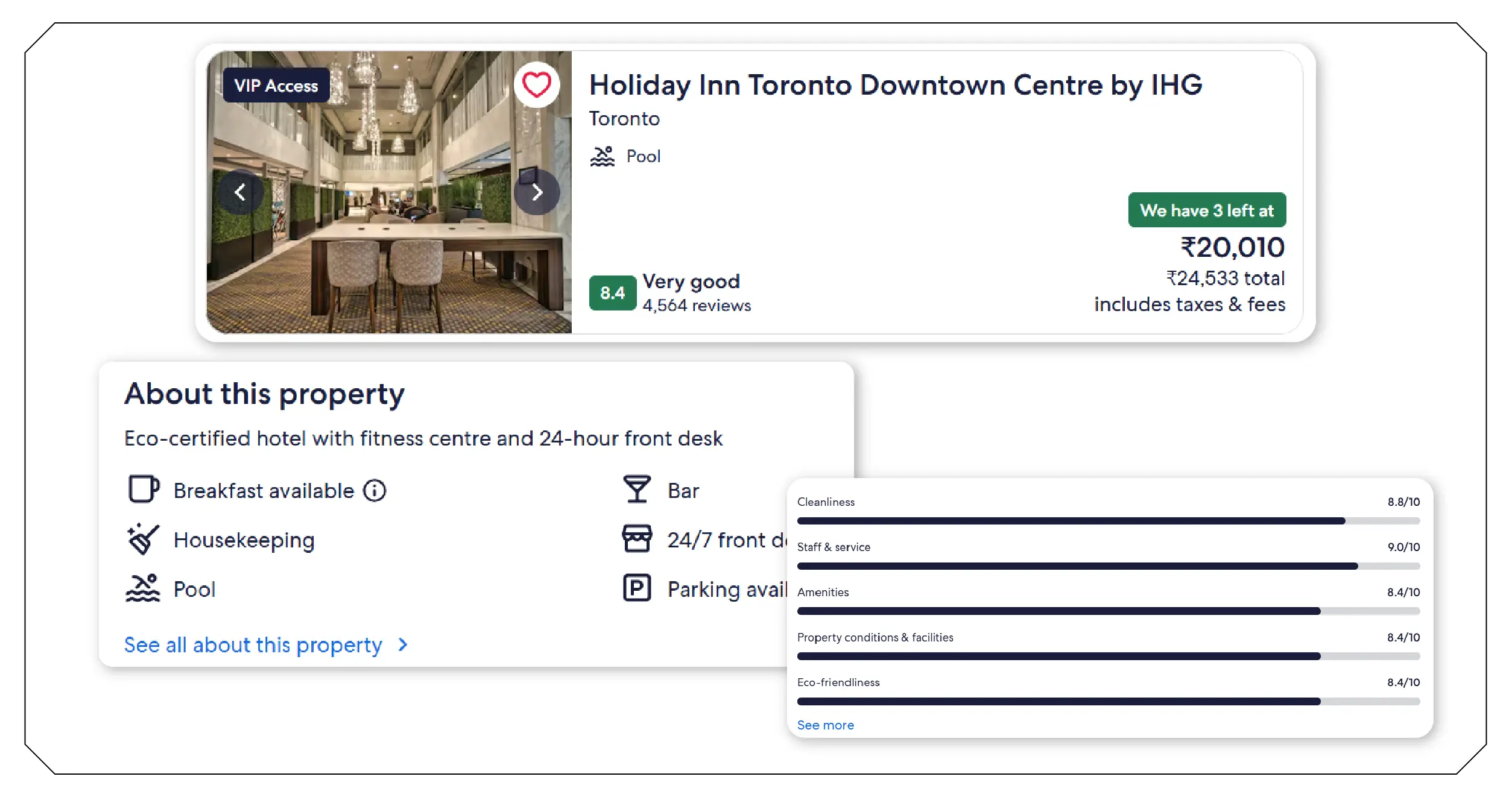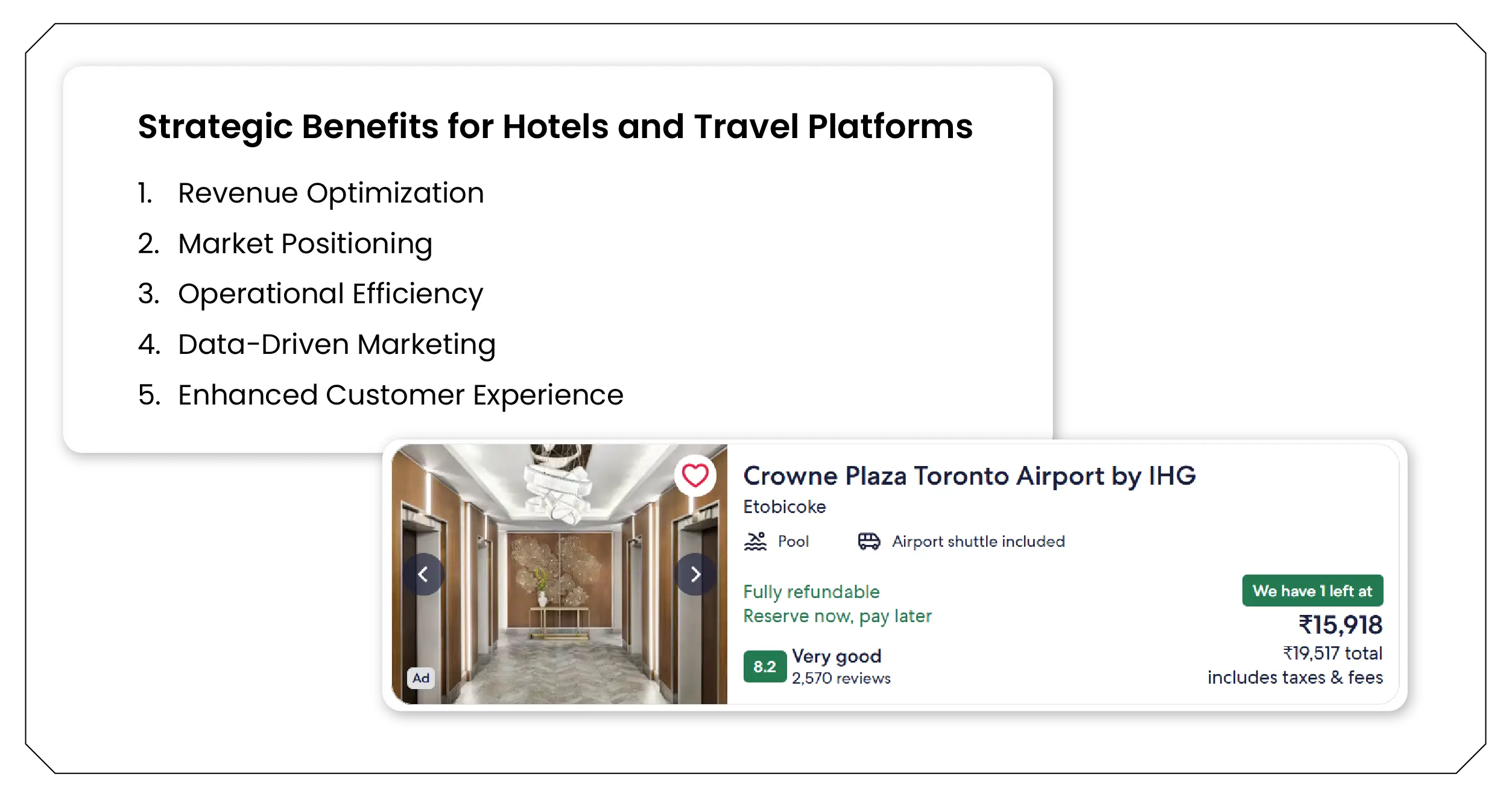How Can You Extract API for Top 10 Hotel Booking Trends to Improve Customer Experience and Occupancy Rates?

Introduction
The hospitality sector has undergone significant changes in recent years, driven by the rise of online travel agencies, dynamic pricing strategies, and a constantly shifting global travel demand. To remain competitive, hotels require accurate and timely data. Utilizing a strategy to Extract API for Top 10 Hotel Booking Trends enables hotels, travel platforms, and market analysts to access structured, real-time insights that support informed business decisions. By analyzing these trends, stakeholders can anticipate guest demand, optimize pricing strategies, and improve operational efficiency, ensuring competitiveness in a rapidly evolving market. When paired with Hotel Data Scraping Services , businesses can aggregate data from multiple sources into a unified, actionable dataset. This approach allows for comprehensive analysis of occupancy rates, seasonal fluctuations, regional differences, and customer behavior. By leveraging these insights, hotels can effectively adjust their offerings, marketing efforts, and pricing strategies, thereby enhancing both revenue and guest satisfaction while maintaining a strategic advantage over competitors.
Understanding the Importance of Hotel Booking Data

Online bookings and travel patterns are increasingly data-driven. Travelers now rely on multiple channels, including OTAs, direct hotel websites, and aggregators, to compare prices and select accommodations. This creates a complex landscape where timely insights into trends are crucial. Scraping Hotel Booking Data via API enables hotels to monitor these dynamics efficiently, gathering information such as room availability, average nightly rates, seasonal peaks, and promotional offers.
Real-time insights allow hotel managers to adapt quickly to changes in customer behavior, such as last-minute bookings or sudden drops in demand. Understanding which room types are popular, which amenities attract customers, and which geographic locations see higher occupancy can significantly improve operational decisions and revenue management.
Key Hotel Booking Trends Observed in 2025
In 2025, hotel booking trends will be shaped by dynamic pricing, evolving traveler preferences, and the continued adoption of technology. Guests increasingly seek flexible bookings, unique experiences, and mobile-friendly options. By analyzing these patterns, hotels can optimize pricing, tailor services, and anticipate demand. Understanding such trends is essential for maintaining competitiveness and maximizing occupancy across diverse markets.
Rise of Dynamic Pricing Models:
Hotels are
increasingly adopting dynamic pricing, adjusting room rates in real time based on
demand, competitor rates, and market conditions. Through Travel Scraping API
Services, businesses can monitor these pricing adjustments across regions and
competitor properties, ensuring optimal pricing strategies are in place.
Increased Popularity of Boutique and Localized Stays:
Travelers are increasingly opting for boutique hotels and unique local experiences
over standardized chains. Real-time hotel booking trend analysis with travel data
scraping APIs can reveal which properties are attracting the most bookings and why,
helping chains adapt their offerings accordingly.
Demand for Flexible Booking Options:
Post-pandemic
travelers often seek flexible cancellation policies. APIs enable the tracking of
booking preferences, highlighting trends in refundable versus non-refundable room
choices, and allow hotels to adjust their policies to meet market expectations.
Mobile and App-Based Bookings Surge:
Mobile booking
continues to grow, with travelers favoring app-based reservations for convenience.
Monitoring mobile booking trends provides valuable insights into app adoption rates
and customer behavior, informing investment decisions in mobile-friendly platforms.
Seasonal Travel Peaks Are Shifting:
Holiday periods,
local events, and festivals influence booking patterns differently each year.
Real-time hotel booking trend monitoring via API helps hotels anticipate demand
surges, optimize inventory, and launch targeted promotions to maximize occupancy and
revenue.
Rise in Last-Minute Bookings:
Many travelers now make
spontaneous travel decisions. Monitoring last-minute booking trends through APIs
enables hotels to adjust pricing dynamically, reduce vacant rooms, and increase
revenue per available room (RevPAR).
Focus on Direct Bookings:
Hotels aim to reduce OTA
commission costs by promoting direct bookings. Tracking competitor rates and
promotional strategies using APIs allows hoteliers to maintain competitive pricing
while encouraging bookings through their channels.
Influence of Customer Reviews on Booking Decisions:
Guest reviews significantly impact booking decisions. Integrating sentiment analysis
and review tracking into booking trend monitoring allows hotels to identify areas
for service improvement and marketing emphasis.
Personalized Travel Packages:
Travelers increasingly
seek tailored experiences. Booking data analytics reveal patterns in room types,
meal plans, and additional services, enabling hotels to craft personalized packages
for higher conversion rates.
Sustainability and Eco-Friendly Preferences:
Modern
travelers prioritize eco-conscious accommodations. Monitoring trends in bookings for
sustainable hotels or green-certified properties enables businesses to align
offerings with growing environmental awareness.
Benefits of Using APIs for Hotel Booking Insights

Hotel Price monitoring through APIs provides precise visibility into rate fluctuations, competitor pricing, and promotional campaigns. Hotels can adjust pricing dynamically, ensuring competitiveness and maximizing revenue.
The Hotel Room Price Trends Dataset , derived from structured API data, enables historical analysis, helping businesses forecast demand, optimize staffing, and plan marketing campaigns more effectively.
APIs enable the aggregation of multi-source data, including OTAs, direct booking channels, and regional aggregators, into centralized dashboards. This integration ensures that decision-makers can access Travel Scraping API Services that consolidate insights in real-time for actionable intelligence.
With automated monitoring, hotels reduce manual data collection, minimize errors, and free up staff for strategic tasks rather than repetitive analysis.
Real-Time Monitoring and Dynamic Strategy Adaptation
Dynamic market conditions necessitate continuous observation of hotel trends. By employing API-driven solutions, hotels can perform hotel booking trend analysis with travel data scraping APIs to track occupancy, booking patterns, and pricing strategies across competitors and regions.
Real-time alerts enable management teams to respond promptly to sudden demand spikes or fluctuations. For example, during a significant event in a city, last-minute booking patterns can indicate a temporary surge in demand, allowing hotels to adjust pricing, release additional rooms, or implement targeted promotions.
Similarly, APIs can track seasonal shifts in traveler preferences, such as demand for suites, family rooms, or premium services, enabling hotels to adjust their inventory and marketing campaigns in advance.
Integrating Data into Operational Workflows
APIs streamline data collection and reporting by feeding structured information directly into Hotel Data Scraping Services platforms. This integration ensures hotels can visualize trends, generate reports, and derive actionable insights efficiently.
For revenue managers, dashboards that display occupancy rates, average daily rates, and revenue per available room (RevPAR) enable them to make informed pricing and inventory decisions. Marketing teams benefit from insights into popular booking channels, promotions that drive higher conversions, and regions with untapped potential.
Furthermore, APIs allow automated benchmarking against competitors, providing visibility into pricing strategies and occupancy rates across the market. This ensures hotels remain proactive rather than reactive in a rapidly evolving industry.
Challenges Addressed by Hotel Booking APIs
- Fragmented Data Sources – Hotels and OTAs generate data across multiple platforms, making manual collection time-consuming. APIs centralize these sources into structured, actionable datasets.
- Rapidly Changing Market Dynamics – Occupancy and pricing fluctuate daily. Real-time API monitoring enables hotels to adjust their strategies promptly.
- Competitive Pricing Pressure – Tracking competitors’ rates via APIs enables hotels to remain competitive without the need for constant manual surveillance.
- Demand Forecasting Complexity – Historical and current booking data aggregated via APIs enables more accurate demand predictions.
- Operational Inefficiencies – Automation reduces errors, saves staff time, and enhances strategic focus, improving overall operational performance.
Key Features of Hotel Booking APIs
- Real-Time Data Extraction – Capture live pricing, availability, and booking trends in real-time.
- Multi-Channel Integration – Aggregate data from OTAs, direct channels, and regional platforms.
- Historical Data Analysis – Build Hotel Room Price Trends Dataset for forecasting and strategy.
- Customizable Dashboards – Visualize occupancy rates, pricing trends, and revenue metrics to gain actionable insights.
- Automated Alerts – Notify teams of sudden shifts in demand or competitor pricing.
Strategic Benefits for Hotels and Travel Platforms

- Revenue Optimization – Utilizing real-time booking and pricing data, hotels can dynamically adjust room rates, maximize occupancy during peak and off-peak periods, and implement revenue management strategies that boost overall profitability consistently.
- Market Positioning – By monitoring competitor pricing, promotions, and offerings, hotels can strategically position themselves in the market, identify opportunities to differentiate, and maintain a competitive edge across various booking platforms.
- Operational Efficiency – Automated data collection reduces the need for manual monitoring, streamlines decision-making processes, and allows hotel staff to focus on strategic initiatives, improving overall operational productivity and responsiveness.
- Data-Driven Marketing – Insights into high-demand periods, customer preferences, and booking patterns enable hotels to design targeted campaigns, optimize promotions, and tailor packages that effectively resonate with specific traveler segments.
- Enhanced Customer Experience – Analyzing trends in room types, amenities, and booking preferences enables hotels to tailor their offerings, enhance service quality, and deliver personalized experiences that increase guest satisfaction and loyalty.
How Travel Scrape Can Help You?
- Real-Time Data Extraction – We collect up-to-date hotel booking information across multiple platforms, providing accurate insights into room availability, pricing, and promotions to support informed decision-making.
- Competitor Monitoring – Track competitor rates, occupancy trends, and special offers across regions, enabling hotels to adjust pricing and positioning to maintain a competitive advantage.
- Custom API Integration – Our solutions integrate seamlessly with travel and booking APIs, enabling automated and scalable scraping of hotel booking data for continuous monitoring and analysis.
- Trend Analysis & Reporting – We transform raw data into actionable insights, highlighting seasonal patterns, high-demand periods, and customer preferences to optimize revenue and marketing strategies.
- Comprehensive Market Insights – Aggregate and structure data from multiple sources to create dashboards, datasets, and reports, enabling hotels to make data-driven strategic decisions efficiently.
Conclusion
In today’s fast-paced hospitality sector, API-driven data extraction is no longer optional. Leveraging Hotel Data Scraping Services provides hotels, travel agencies, and analysts with a strategic advantage by delivering structured, real-time insights. It ensures comprehensive coverage of room availability, pricing, and competitor activities, helping businesses make informed decisions.
By integrating API into operational workflows, hotels can optimize pricing strategies, forecast demand, and maximize revenue. The use of hotel booking datasets via API for market insights, trend analysis, and datasets empowers decision-makers with actionable insights. Ultimately, extracting, analyzing competitive offerings, and leveraging a Hotel Price Comparison API enable hotels to remain agile, profitable, and fully aligned with market dynamics.
Additionally, Extracting hotel booking rates and availability using API data ensures that hospitality businesses stay ahead of evolving traveler preferences, anticipate demand, and maintain a strong competitive edge in the global marketplace.
Ready to elevate your travel business with cutting-edge data insights? Extract Aggregated Hotel Prices to identify competitive rates and optimize your revenue strategies efficiently. Discover emerging opportunities with tools to Extract Travel Industry Trends , leveraging comprehensive data to forecast market shifts and enhance your service offerings. Stay ahead of competitors by monitoring Real-Time Travel Mobile App Data , gaining instant insights into bookings, promotions, and customer behavior across multiple platforms. Get in touch with Travel Scrape today to explore how our end-to-end data solutions can uncover new revenue streams, enhance your offerings, and strengthen your competitive edge in the travel market.